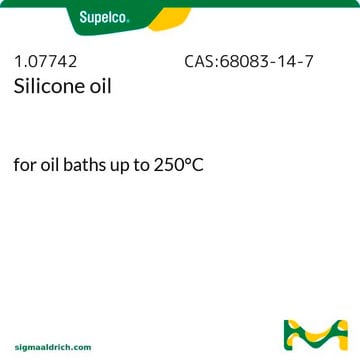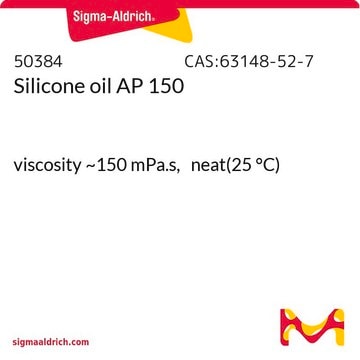Wszystkie zdjęcia(1)
Kluczowe dokumenty
85409
Silicone oil
Synonim(y):
Dimetylopolisiloksan
Zaloguj sięWyświetlanie cen organizacyjnych i kontraktowych
About This Item
Wzór liniowy:
[-Si(CH3)2O-]n
Numer CAS:
Numer MDL:
Kod UNSPSC:
12352100
NACRES:
NA.21
Polecane produkty
gęstość pary
>1 (vs air)
Poziom jakości
ciśnienie pary
<5 mmHg ( 25 °C)
5 mmHg ( 20 °C)
Formularz
oil
współczynnik refrakcji
n20/D 1.403 (lit.)
n20/D 1.406
lepkość
100 mPa.s(20 °C)
bp
>140 °C/0.002 mmHg (lit.)
gęstość
0.967 g/mL at 20 °C
Szukasz podobnych produktów? Odwiedź Przewodnik dotyczący porównywania produktów
Powiązane kategorie
Opis ogólny
Silicone oil is typically used for oil baths in research labs for reactions that require heating/reflux temperatures in the range of -50°C to +200°C. Oil baths provide more uniform heat in comparison to other heating devices.
Silicone oil is useful for the preparation of oil baths having a temperature in the range of -50°C to +200°C.
Zastosowanie
Silicone oil has been used for the protection of carbon steel alloy samples in a study. Silicone oil has also been used as a heat reservoir during NMR (Nuclear Magnetic Resonance) analysis.
Ta strona może zawierać tekst przetłumaczony maszynowo.
Kod klasy składowania
10 - Combustible liquids
Klasa zagrożenia wodnego (WGK)
WGK 1
Temperatura zapłonu (°F)
214.0 °F - closed cup
Temperatura zapłonu (°C)
101.1 °C - closed cup
Środki ochrony indywidualnej
Eyeshields, Gloves
Wybierz jedną z najnowszych wersji:
Masz już ten produkt?
Dokumenty związane z niedawno zakupionymi produktami zostały zamieszczone w Bibliotece dokumentów.
Klienci oglądali również te produkty
Low-temperature atomic layer deposition of Al2O3 thin coatings for corrosion protection of steel: surface and electrochemical analysis.
Diaz B, et al.
Corrosion Science, 53(6), 2168-2175 (2011)
M Findeisen et al.
Magnetic resonance in chemistry : MRC, 45(2), 175-178 (2006-12-13)
Most established NMR thermometers rely on temperature-dependent chemical shift differences measured from samples that are either neat or concentrated solutions (e.g. ethylene glycol, methanol). These are unsuitable for modern cryoprobes on account of strong radiation damping resulting from the high
Ryan G Porter et al.
Otology & neurotology : official publication of the American Otological Society, American Neurotology Society [and] European Academy of Otology and Neurotology, 34(2), 304-310 (2013-02-28)
To describe a successful paradigm for the treatment of large acoustic neuromas (vestibular schwannomas). Retrospective case review. Tertiary referral center. The charts of 2,875 acoustic neuroma patients at Michigan Ear Institute were reviewed to identify 153 patients who underwent surgical
Zhentian Shi et al.
Journal of the Air & Waste Management Association (1995), 63(1), 80-86 (2013-03-02)
The use of surfactants during soil washing process can create massive foam, which has a negative impact on the effective use of equipment. A series of tests was conducted to evaluate the defoaming performance of three defoamers and to investigate
Benjamin R Schudel et al.
Lab on a chip, 13(5), 811-817 (2013-01-31)
RNA interference (RNAi) is a powerful tool for functional genomics with the capacity to comprehensively analyze host-pathogen interactions. High-throughput RNAi screening is used to systematically perturb cellular pathways and discover therapeutic targets, but the method can be tedious and requires
Nasz zespół naukowców ma doświadczenie we wszystkich obszarach badań, w tym w naukach przyrodniczych, materiałoznawstwie, syntezie chemicznej, chromatografii, analityce i wielu innych dziedzinach.
Skontaktuj się z zespołem ds. pomocy technicznej



